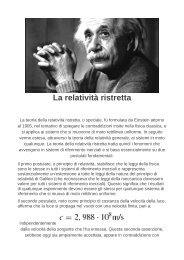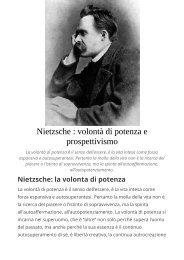Alzheimer
You also want an ePaper? Increase the reach of your titles
YUMPU automatically turns print PDFs into web optimized ePapers that Google loves.
<strong>Alzheimer</strong>’s disease<br />
<strong>Alzheimer</strong>'s disease (AD), also referred to simply as <strong>Alzheimer</strong>'s, is a chronic<br />
neurodegenerative disease that usually starts slowly and worsens over time.It<br />
is the cause of 60% to 70% of cases of dementia.The most common early<br />
symptom is difficulty in remembering recent events (short-term memory<br />
loss).As the disease advances, symptoms can include problems with language,<br />
disorientation (including easily getting lost), mood swings, loss of motivation,<br />
not managing self care, and behavioural issues.As a person's condition<br />
declines, they often withdraw from family and society. Gradually, bodily<br />
functions are lost, ultimately leading to death. Although the speed of<br />
progression can vary, the average life expectancy following diagnosis is three to<br />
nine years.<br />
During the course of the disease, proteins build up in the brain to form<br />
structures called 'Amyloid plaques' , formed by the protein<br />
Beta Amyloid and axon’s fragments , and ' Neurofibrillary tangles' ( Which are<br />
a cytoskeletal degeneration ). This leads to the loss of connections between<br />
nerve cells, and eventually to the death of nerve cells and loss of brain tissue.<br />
People with <strong>Alzheimer</strong>'s also have a shortage of some important chemicals in<br />
their brain. These chemical messengers ( like serotonin and melatonin) and<br />
help to transmit signals around the brain. When there is a shortage of them,<br />
the signals are not transmitted as effectively.<br />
The cause of <strong>Alzheimer</strong>'s disease is poorly understood. About 70% of the risk is<br />
believed to be genetic with many genes usually involved. Other risk factors<br />
include a history of head injuries, depression, or hypertension. The disease<br />
process is associated with plaques and tangles in the brain. A probable<br />
diagnosis is based on the history of the illness and cognitive testing with<br />
medical imaging and blood tests to rule out other possible causes. Initial<br />
symptoms are often mistaken for normal ageing. Examination of brain tissue is<br />
needed for a definite diagnosis.Mental and physical exercise, and avoiding<br />
obesity may decrease the risk of AD; however, evidence to support these<br />
recommendations is not strong. There are no medications or supplements that<br />
decrease risk.
No treatments stop or reverse its progression, though some may temporarily<br />
improve symptoms. Affected people increasingly rely on others for assistance,<br />
often placing a burden on the caregiver; the pressures can include social,<br />
psychological, physical, and economic elements. Exercise programmes may be<br />
beneficial with respect to activities of daily living and can potentially improve<br />
outcomes. Treatment of behavioural problems or psychosis due to dementia<br />
with antipsychotics is common, but not usually recommended, as there is little<br />
benefit with an increased risk of early death.<br />
The cause for most <strong>Alzheimer</strong>'s cases is still mostly unknown except for 1% to<br />
5% of cases where genetic differences have been identified. The genetic<br />
heritability of <strong>Alzheimer</strong>'s disease (and memory components thereof), based<br />
on reviews of twin and family studies, range from 49% to 79%. Around 0.1% of<br />
the cases are familial forms of autosomal (not sex-linked) dominant<br />
inheritance, which have an onset before age 65. This form of the disease is<br />
known as early onset familial <strong>Alzheimer</strong>'s disease. Most of autosomal<br />
dominant familial AD can be attributed to mutations in one of three genes:<br />
those encoding amyloid precursor protein (APP) and presenilins 1 and 2






